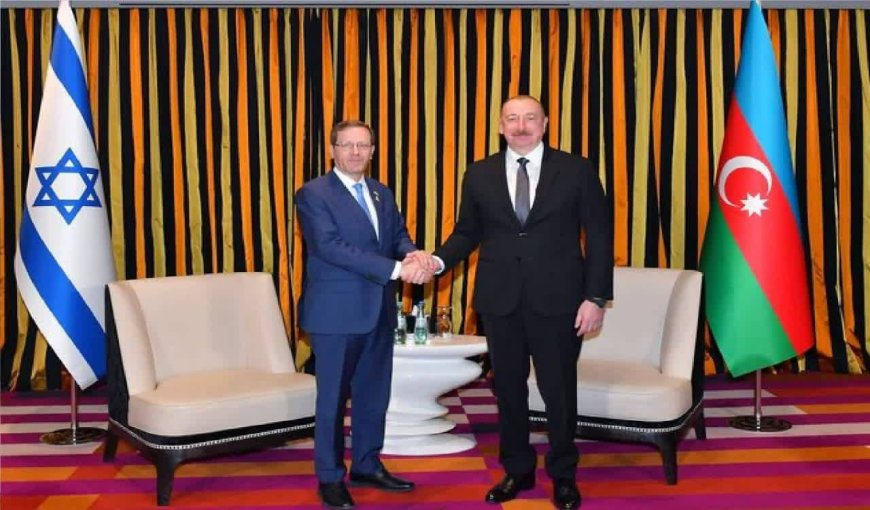The Treacherous Tango: The Deepening Ties between Azerbaijan and the Israeli Regime

By: M. S. Qorbani
In recent years, the intricate dance between the Israeli regime and the Republic of Azerbaijan has been steadily evolving and expanding. Initially perceived as a relationship revolving around the procurement of military hardware and logistical support by the Israeli regime for the beleaguered Azerbaijani army in exchange for vital oil supplies, a deeper exploration reveals dangerous dynamics at play.
Beyond the mere military cooperation and economic ties, a profound aspect emerges as a defining feature of this sinister alliance. Today, Baku stands as a significant supplier of energy for Israel, providing nearly 40% of its petrochemical needs. Revelations from diplomatic dispatches published by WikiLeaks shed light on the political proclivities of President Ilham Aliyev, likening the known depth of his dependence on Israel to an iceberg, where only a fraction is visible to the observers. This analogy underscores the extensive and pervasive nature of the ties between the Israeli regime and the authoritarian regime of Azerbaijan, illustrating the intricate web of influence woven across various strata of the Azeri oligarchic regime.
At the core of Israel's strategic calculus lies a longstanding policy rooted in the Ben Gurion doctrine aimed at bolstering ties with non-Arab Muslim nations like Azerbaijan. This strategic outreach serves a dual purpose: countering Iran's regional influence, owing to Azerbaijan's proximity to the Islamic Republic, while also reaping economic dividends from such diplomatic overtures. Conversely, Azerbaijan's primary objective in cultivating these nefarious ties lies in its quest to court the notorious Zionist lobbies worldwide, particularly in the United States and Europe, as a means to neutralize Armenian pressure groups and foster a favorable international image in Western media and power corridors. While Azerbaijan's military procurements span the globe, from China to Russia and the US, a substantial portion of these dealings have their origins in Israel. Reports from the Israeli daily "Haaretz" underscore the strategic alliance that has been promoted over the past two decades, with Tel Aviv supplying Baku with a significant military arsenal.
Notably, the establishment of the Israeli embassy in Baku in 1993 was met with a protracted delay in reciprocation from Azerbaijan, which sought to navigate its relations with Tel Aviv while appeasing Muslim nations, particularly Iran.
The delicate balancing act between Azerbaijan and Israel reached a historic juncture in 2022 when Azerbaijan’s hand-picked Parliament sanctioned the opening of an embassy in Tel Aviv and the exchange of ambassadors, signaling a significant milestone in their ties. However, concerns loom large over the underlying motives behind Azerbaijan's diplomatic gesture, with speculations rife about Tel Aviv leveraging Baku as a hub for espionage activities against Iran. As mentioned earlier, the strategic implications of this burgeoning partnership extend beyond mere military and economic realms, with Azerbaijan viewing its alignment with Israel as a gateway to fostering closer ties with Western powers, notably the United States. This alignment serves as a strategic lever for Azerbaijan to address its security concerns and counter the influence of the powerful Armenian diaspora lobby, notable in France and the US, while the Israeli regime seeks to mitigate the existential threats posed by Iran's regional presence by establishing bases along the Azerbaijani-Iranian border.
As these alliances deepen and strategic interests intertwine, the specter of regional conflict looms large on the horizon. The unprecedented ballistic strike by the Islamic Republic of Iran on Israeli military and espionage installations serves as a stark reminder of the volatile landscape in which these alliances operate. The potential ramifications of any misstep on the part of the Azeri regime in this geopolitical chessboard could exact a heavy toll on regional stability, with Azerbaijan finding itself ensnared in the crossfire should tensions further escalate between Iran and Israel. To put it in other words, the gamble undertaken by Aliyev to deepen ties with Tel Aviv carries inherent risks, with the potential for everlasting repercussions should the delicate equilibrium of regional power dynamics falter.
In conclusion, the evolving nexus between Azerbaijan and the Israeli regime transcends conventional diplomatic paradigms, weaving a complex tapestry of political machination and regional power plays. As these alliances mature and intersect, the delicate balance of power in the region hangs in the balance, with the potential for seismic shifts lurking ominously on the horizon. The interplay between Azerbaijan and Israel serves as a microcosm of the web of alliances and rivalries that define the modern geopolitical landscape, underscoring the high stakes that characterize diplomatic relations in a volatile world.













































